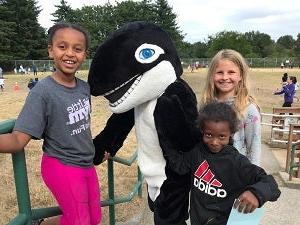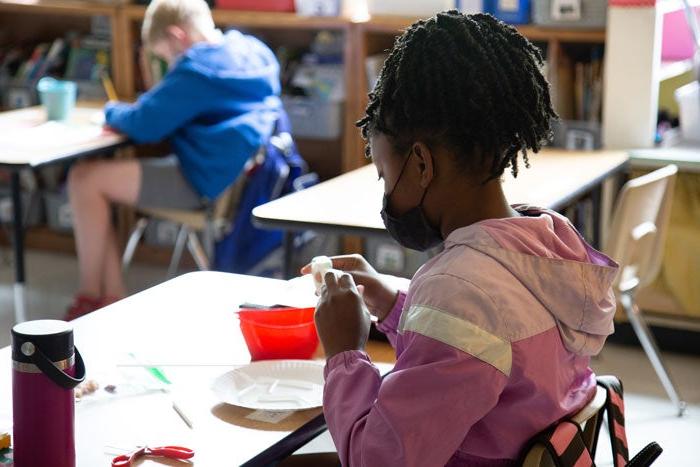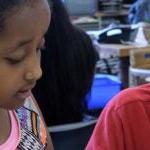4th Grade
A Family Guide to 4th Grade
在每个年级,SPS的核心工作是支持学生的学习. We believe it is our responsibility to do whatever it takes to ensure that every child, regardless of race, gender, socioeconomic status, language proficiency, learning style or disability, achieves to their highest level.
四年级是成长的时期! Your child is beginning to develop the skills to manage and initiate their own learning, 你可能会对他们发现的新兴趣感到惊讶.
To support learning, 问一些开放式的问题是有帮助的, 那种不能用“是”或“不是”来回答的问题.”
四年级学生往往渴望展示他们所知道的东西, so encourage your child to describe what they are doing in class through drawing, 写作或展示新的技能或想法, as well as talking about them.
Your child’s teachers can help you understand more about the topics that interest or challenge them, 你可以分享他们的习惯. Do they like to move around, be part of a group, or have a quiet space when they read or study? 他们喜欢竞争还是在没有压力的情况下工作得更好?
Important Dates
September
- 1st day of school
November
- Parent-Teacher Conferences
December
- End of 1st Trimester; 1st Progress Report Available
March
- End of 2nd Trimester; 2nd Progress Report Available
June
- End of 3rd Trimester; 3rd Progress Report Available
Student Progress Reports
The clear learning standards in the report card may help your 4th grader. Children this age can make plans and connections, think deeply, and understand more complex ideas. They can talk with you about why they are or are not meeting expectations in each area, and you can challenge them to think about how they can improve their skills. By sharing ideas, teachers and families discover new ways to motivate learning.
Teachers and families should pay attention to social-emotional skills and learning readiness expectations and understand academic goals in language arts, math, science, social studies, physical education and arts. Fourth graders who see what they need to know and feel confident and supported will make progress!
How to Access Progress Reports
家庭将使用“源”查看学生进度报告.
Parent and guardians can create an account with the email on record at their student’s school.
Student Success by Subject
Social Emotional Learning
At Seattle Public Schools we believe that social emotional learning prepares students for learning and life.

社会情绪学习(SEL)帮助儿童:
• Manage emotions, show empathy
• Develop a healthy identity
• Make responsible decisions
• Have positive relationships
• Contribute to their community
这些技能对学习和生活都很重要.
At school, students learn and practice SEL skills throughout the day.
Reading and Writing
在英语语言艺术(ELA)课程中,四年级学生学习:
- 独立阅读不同类型或体裁的作品
- Summarize their reading
- Find the main idea and share details from the text to support their thinking
- 思考角色的行为以及它们对故事的影响
- 能够准确流利地阅读和理解年级水平的课文, 找出不认识的单词的意思
- 用事实和细节写出他们的观点或信息
- 努力计划和编辑,使写作更清晰,更有条理
- 为不同的目的和读者写作
- 参与课堂合作对话
鼓励孩子每天阅读20分钟或更长时间.
Math

In 4th grade math, students will build on their 3rd grade understanding of the base-10 number system, multiplication, and fractions to:
- Understand and use properties of the four operations to solve single and multistep problems involving whole numbers
- Demonstrate understanding of place value for multi-digit whole numbers
- Multiply multi-digit numbers using place value understanding and properties of operations
- Divide multi-digit numbers by single digit numbers using place value understanding, properties of operations, 乘法和除法的反比关系
- 能熟练掌握1,000,000以内的加减法
- 理解分数等价性,并用它来比较分数
- 从单位分数构建分数(i.e., 1/3, 1/4, 1/8)使用加法和乘法
- 将分数乘以整数
- Use decimal notation for fractions with denominators of 10 or 100
- 比较两个小数点到百分位
- Solve problems involving measurement including conversion from a larger unit to a smaller unit
- 理解角度的概念和测量角度
我们相信所有的学生都有数学天赋. Your child’s teacher seeks to cultivate brilliance to develop your child into a mathematical thinker and problem solver. 你的孩子会看到谁在他们的生活中看到数学的价值.
Science
三年级学生学了什么科学?
这是科学教育转型的时代, with teaching and learning focused on three key areas in Washington state Science Learning Standards:
- Science/engineering practices used by professionals to explain the world or solve problems
- 核心思想,包括基本的科学知识
- Crosscutting concepts frame scientific thinking across life, earth/space, physical sciences.
你孩子的成绩单显示了你对他们的表现期望S,即学生在一个单元结束时应该能够做什么. 这三个维度被编织到每个表现期望中.
Get outside together, taking time to notice, appreciate, and wonder about the natural world.
Social Studies
四年级的社会学有什么重要的?
The report card shows five areas of social studies that you and your child can discuss.
- Civics – Understanding how governments are organized into levels; rights and responsibilities in the WA State Constitution
- Economics -了解西澳的经济、环境和人口
- Geography – Understanding physical and
- 太平洋西北地区的文化特色
- History – Using multiple perspectives to learn about Washington State history
- Social Studies Skills – using questions and multiple sources to find information, and make conclusions
Physical Education
In physical education (PE), students build movement skills, knowledge, fitness, social well being, 和自信让他们可以享受健康的生活, active lifestyle. Seattle Public Schools is committed to providing a quality physical education program to help students develop in these areas.
Our PE standards 是基于运动和运动模式和技能吗, 以及像身体素养这样的概念, which is the ability, confidence, 并且渴望一生都积极锻炼身体. PE is an instructional program, 这和课间休息有什么不同, free play, recreational sports, or athletics.
PE teachers work with general education teachers to provide high quality instruction for an average of 100 minutes per week, 这是华盛顿州法律要求的吗. 学校以不同的方式组织体育时间, but all students should be learning about their physical selves all year long!
Visual and Performing Arts
Research shows that students with an arts education are more engaged, do better in school, and are more likely to graduate and participate in community life. In Seattle Public Schools, 我们希望每个学生都能得到全面的评价, 在幼儿园到12年级期间接受可预测的艺术教育.
每所小学提供不同的艺术课程, 从可能性包括视觉艺术, general music, theatre, dance, or instrumental music.
Progress report standards come from the Washington state Arts Learning Standards, which focus on aspects of artistic process:
- Creating:发展新的艺术思想和作品.
- Performing:解释和展示艺术思想/作品
- Responding理解和评价艺术中的意义
- Connecting与艺术思想和作品有关的
The arts are a core subject!
Make art together!

